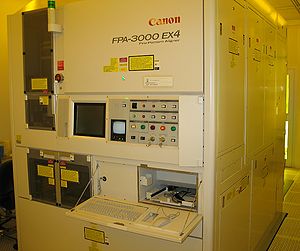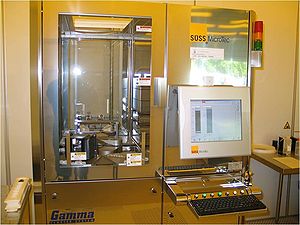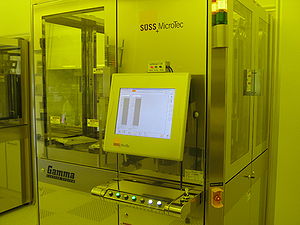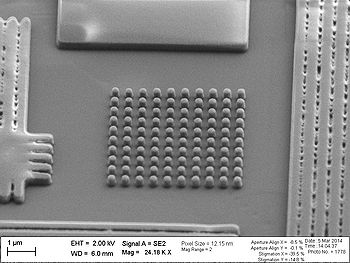Specific Process Knowledge/Lithography/DUVStepperLithography: Difference between revisions
| Line 208: | Line 208: | ||
===Standard processes=== | ===Standard processes=== | ||
Post-exposure bake: | |||
*'''(1000) DCH PEB 130C 60s''' 60s baking at 130°C | *'''(1000) DCH PEB 130C 60s''' 60s baking at 130°C | ||
*'''(1001) DCH PEB 130C 90s''' 90s baking at 130°C | *'''(1001) DCH PEB 130C 90s''' 90s baking at 130°C | ||
Development: | |||
*'''(1004) DCH DEV 60s''' 60s single puddle development | |||
PEB and development: | |||
*'''(1002) DCH PEB_60s and DEV_60s''' 60s baking at 130°C followed by 60s single puddle development | *'''(1002) DCH PEB_60s and DEV_60s''' 60s baking at 130°C followed by 60s single puddle development | ||
*'''(1003) DCH PEB_90s and DEV_60s''' 90s baking at 130°C followed by 60s single puddle development | *'''(1003) DCH PEB_90s and DEV_60s''' 90s baking at 130°C followed by 60s single puddle development | ||
The standard developer process consists of: | The standard developer process consists of: | ||
Revision as of 08:07, 19 May 2016
DUV Stepper

Feedback to this section: click here
The deep-UV stepper FPA-3000EX4 from Canon is an advanced exposure system designed for mass-production of 6 and 8 inch wafers/ devices having a throughput of up to 90 wafers per hour. The largest applicable thickness of the wafers/ devices is 1,2 mm. Also 4" wafers/ devices can be processed with some restrictions concerning throughput, resolution, uniformity and maximum allowed wafer thickness. The system is equipped with a KrF Excimer laser from Cymer (wavelength 248 nm). Its projection lens’ NA is variable over a range between 0,4 and 0,6. Additionally, the partial coherence factor (σ) of the illumination system can be adjusted and different off-axis illumination modes can be selected.
The critical dimension (CD) of patterns that can be realized is specified at around 250nm for arbitrary formed patterns in the standard illumination mode (NA=0,6; σ =0,65). However, the best achievable resolution is different for each pattern type, pattern shape and pitch. So linewidths down to 160 nm could be achieved for geometrically simple patterns or pattern arrays (single and multiple line or pin-hole structures).
The user manual(s), quality control procedure(s) and results and contact information can be found in LabManager:
Equipment info in LabManager
Process information
| Purpose |
Exposure system designed for mass/production of devices with linewidth down to 250nm | ||
|---|---|---|---|
| Specifications | Magnification |
1:5 | |
| Projection lens Numerical Aperture |
0,4 - 0,60 | ||
| Illumination system's σ |
0,2 - 0,75 (standard illumination mode: σ = 0,65) | ||
| Exposure source |
KrF laser | ||
| Wavelength |
248nm | ||
| Illumination intensity |
2800 W/m2 | ||
| Illumination uniformity |
1,2% | ||
| Maximum printed field size |
22 x 26 mm (maximum on wafer) | ||
| Alignment accuracy |
3 sigma = 50 nm | ||
| Substrates | Substrate size |
| |
| Allowed materials |
| ||
| Batch |
1 - 25 | ||
SÜSS Spinner-Stepper

Feedback to this section: click here
This spinner is dedicated for spinning DUV resists. The spinner is fully automatic and can run up to 25 substrates in a batch 4", 6", and 8" size (8" requires tool change). The machine is equipped with the 3 resist lines (DUV42S-6, KRF M230Y, and KRF M35G), an automatic syringe system and a solvent line for cleaning and back-side rinse.
The user manual, and contact information can be found in LabManager: Equipment info in LabManager
Process information
The spinning process will be performed by the customer together with the Photolith group of Danchip. In case you would like to do DUV lithography please contact Lithography team, who will consult you and run your wafers together with you.
Information about resist can be found here:
- Bottom Anti Reflection Coating (BARC) DUV 42S-6 Datasheet DUV42S-6.
- Positive DUV resist for spinning in 600-300nm thickness range KRF M230Y.
- Positive DUV resist for spinning in 1600-800nm thickness range KRF M35G.
- Negative DUV resist for spinning in 1400-800nm or diluted with EC Solvent in 1:1 in 400-200nm thickness range UVN2300-0.8.
Standard processes
BARC DUV42S-6:
- (1001) DCH 150mm BARC 65nm Dispense 3ml@1000rpm; spin-off 60s@4700rpm; softbake 60s@175°C
- (1002) DCH 100mm BARC 65nm Dispense 1.6ml@1000rpm; spin-off 60s@4700rpm; softbake 60s@175°C
KRF M230Y:
- (1011) DCH 150mm M230Y 360nm Dispense 3.9ml@1000rpm; spin-off 60s@2500rpm; softbake 90s@130°C
- (1012) DCH 100mm M230Y 360nm Dispense 1ml@1000rpm; spin-off 60s@2500rpm; softbake 90s@130°C
KRF M35G:
- (1021) DCH 150mm M35G 750nm
- (1022) DCH 100mm M35G 750nm
- (1023) DCH 150mm M35G 1000nm
- (1024) DCH 100mm M35G 1000nm
- (1025) DCH 150mm M35G 1400nm
- (1026) DCH 100mm M35G 1400nm
| Purpose |
| ||
|---|---|---|---|
| Resist |
| ||
| Performance | Coating thickness |
| |
| Process parameters | Spin speed |
10 - 5000 rpm | |
| Spin acceleration |
100 - 10000 rpm/s | ||
| Hotplate temperature |
| ||
| Substrates | Substrate size |
| |
| Allowed materials |
| ||
| Batch |
1 - 25 | ||
Developer TMAH Stepper

Feedback to this section: click here
This developer is dedicated for development of DUV resists. The developer is fully automatic and can run up to 25 substrates in a batch 4", 6", and 8" size (8" requires tool change). The machine is equipped with 1 developer line, in our case 2,38% TMAH in water (AZ 726 MIF), 1 topside rinse line with water, 1 backside rinse line with water and 1 N2 line for drying.
The user manual and contact information can be found in LabManager: Equipment info in LabManager
Process information

The development process will be performed by the customer together with the Photolith group of Danchip. In case you would like to do DUV lithography please contact Lithography team, who will consult you and run your wafers together with you.
Here you can find a chart demonstrating a dependence between 250nm line width/pillors diameter and exposure dose.
Standard processes
Post-exposure bake:
- (1000) DCH PEB 130C 60s 60s baking at 130°C
- (1001) DCH PEB 130C 90s 90s baking at 130°C
Development:
- (1004) DCH DEV 60s 60s single puddle development
PEB and development:
- (1002) DCH PEB_60s and DEV_60s 60s baking at 130°C followed by 60s single puddle development
- (1003) DCH PEB_90s and DEV_60s 90s baking at 130°C followed by 60s single puddle development
The standard developer process consists of:
- pre-wetting with water (2.5s @ 1000rpm)
- developer dispense (2.5s @ 40rpm, corresponding to ~9ml)
- development (60s @ 0rpm)
- water rinse with BSR (5s @ 3000rpm)
- nitrogen drying (7s @ 4000rpm)
and has a cycle time of ~2 minutes
| Purpose |
Development of DUV resist: KRF M230Y and KRF M35G | ||
|---|---|---|---|
| Developer |
2,38% water based TMAH | ||
| Process parameters | Spin speed |
10 - 5000 rpm | |
| Spin acceleration |
100 - 10000 rpm/s | ||
| Hotplate temperature |
130°C for post exposure baking | ||
| Substrates | Substrate size |
| |
| Allowed materials |
| ||
| Batch |
1 - 25 | ||
